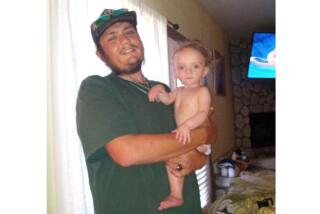Recovering From Child Abuse : Psychology: Researchers find that victims do heal, but help from families and community agencies determines how quickly. McMartin is among the preschools examined.
- Share via
A five-year study of sexual abuse in preschools, released today by UCLA, has concluded that, with the right kind of help, most children who say they have been molested eventually recover from the resulting fear, anxiety and behavior problems, even though recovery may take months or years.
Funded by the federal government’s National Center on Child Abuse and Neglect, the UCLA study gives researchers the most detailed look yet at the extended effects of child abuse. Previous studies generally lasted no longer than a year or so, said David Finkelhor, co-director of the Family Research Laboratory at the University of New Hampshire and one of the country’s leading experts on child abuse.
Moreover, it also documents “very clearly the kinds of active support and care families and communities must provide” in the aftermath of reports of child abuse, Finkelhor said.
In general, the report concluded, children who experienced fewer behavioral and emotional problems were those whose mothers were supportive and spent significant time with them, and whose families were close and actively sought professional and community help. Those children who had the most problems were from families who tried to avoid talking about and dealing with the situation.
The UCLA study evaluated the behavior and experiences of 82 children from preschools in Manhattan Beach and 15 in Reno, Nev., where there had been reports of sexual abuse in the spring and fall of 1983. The children who said they had been abused were compared to a control group of 37 children from two Southern California preschools where no problems of sexual abuse had been reported.
At the time they reported abuse, the children in the Manhattan Beach schools were between 2 and 6 and those in the Reno preschools were between 3 and 7.
The encouraging news of the study is that “the vast number of these youngsters (about two-thirds) do seem to be healed and able to get on with their lives,” said Jill Waterman, a UCLA psychologist and one of the principal investigators in the study.
That does not mean there will not be scars. Nor does it mean that all children who said they were sexually abused fared equally well.
More than 83% of the Manhattan Beach children as compared to fewer than 36% of the Reno children were reported by their therapists to be suffering post-traumatic stress disorder--a fear of death and torture normally associated with war veterans. Most of the Reno children seemed to recover relatively quickly, while the study found that 17% of the children from Manhattan Beach schools still suffered from serious problems five years after the disclosures of abuse.
One explanation of the difference between the two cities, the researchers said, may have to do with the kinds of abuse the children reported. Those in Reno said they were sexually molested, while those in Manhattan Beach told of terrorizing acts of animal torture, Satanic rituals and death threats, in addition to sexual molestation.
Another possibly significant difference between the two groups, the researchers speculated, had to do with community and legal reaction to the children’s disclosures.
In Reno, there was a single perpetrator who, having admitted to more sexual molestation than children reported, was immediatedly sentenced to four life terms in prison.
In Manhattan Beach, the children complained of multiple perpetrators. In a case arising from one of the preschools in the study, one jury acquitted suspect Ray Buckey, who taught at the McMartin Pre-School, on 40 counts of molestation, and a jury in a second trial became hopelessly deadlocked on eight other counts. While many jury members said afterward that they were convinced the children were telling the truth, they were not certain who was responsible.
Waterman said it is not the job of researchers in this or any other study to determine guilt or innocence. What scientists must look at is data, and in this study the children--what they said and how they behaved--was the data to be studied.
Although the researchers acknowledge they had no way of proving what actually happened, they said there were many indications to suggest the children were telling the truth. In a general population of children, Waterman noted, only about 2.5% would be expected to have psychological problems, whereas 17% of the Manhattan Beach children had lingering problems.
Moreover, the problems exhibited by the children both in Manhattan Beach and Reno were ones often associated with sexual abuse--outbursts of anger, problems sleeping, difficulties concentrating, recurrent nightmares, withdrawal--rather than disorders in thinking or psychotic illusions, which are often seen in patients who make up stories and tell lies.
Because all the children in the UCLA study participated in some form of psychotherapy following their disclosures, there was no way of knowing what might have happened had they not been treated. And while different methods of psychotherapy were used by different counselors, there was no one method that seemed to work better than others, the study found.
What did seem to make a difference was how the families reacted to the crisis.
“The families that said, ‘We’ll overcome this’ and took steps to do so did better,” Waterman observed. “Families that coped by using passive measures--such as watching television or feeling that problems will go away by themselves--did worse, as did families in which the parents were less supportive of their children. If the family members can focus on supporting each other and weathering this crisis together, the outcome will be more positive.”
In general, the children who experienced the fewest behavior problems and the least emotional stress were the ones who had families who were the closest, who fought the least and who were most willing to turn to community and professional resources for help. Those with the speediest and fullest recoveries also tended to have mothers whom they perceived as spending more time with them and providing them with greater comfort and praise.
Clearly, the researchers found, mothers and fathers tended to have different coping styles in dealing with the situation, and what both do are equally important.
In the initial aftermath of reports that their children had been abused, mothers immediately became more affectionate toward their children, while fathers tended to be significantly less comfortable showing physical affection, in some cases for as long as a year afterward. Both parents tended to be more lenient with their children, although with time mothers gradually returned to their old styles of discipline.
Overall, fathers tended to minimize the abuse and to seek whatever help they got from their wives, whereas their wives tended to go outside the home for help, often seeking aid and solace from friends. These findings, Waterman said, coincide with the differences that are often observed between women, who tend to be more vocal about their feelings, and men, who tend to be more reserved.
Fathers who were able to reach out and become actively involved seemed to have a very positive impact on their children’s recovery, the researchers observed. That was not always the case with mothers, however. Those mothers who became too involved in outside activities, especially in public education about sexual abuse, had children who tended to recover less quickly.
Perhaps, the researchers theorized, those children felt abandoned by their mothers. It is also possible that the mothers who spoke out most publicly against child abuse were ones whose children were most traumatized and therefore likely to have the longest and most painful recovery period.
For almost all the families, there was increased stress between parent and child, as well as greater stress between parents in the early weeks and months after reports of sexual abuse. Yet, during the study only a handful of marriages broke up in Manhattan Beach and none of the marriages dissolved in Reno, the researchers said.
“Marriages that survived--and the vast majority did--were substantially stronger and families felt the crisis had brought them closer together,” she said. “This increased closeness after going through a trauma together appears to be an unexpected ‘silver lining.’ ”
In conducting the study, the researchers administered psychological tests and questionnaires and conducted detailed face-to-face interviews, not only with the children but also with their parents and counselors.
In an effort to keep the names of the families confidential and in hopes of not having their data subpoenaed by the courts, the researchers did not identify in the study which of several preschools the students attended. However, Waterman acknowledged in an interview that McMartin was one. In the wake of accusations, several preschools in Manhattan Beach and Reno shut down, including McMartin.
Details of what has happened to the children and their families will be published first in a scholarly journal and then appear in a book sometime next year. In addition to Waterman, the study was conducted by Robert Kelly, assistant clinical professor of psychology at UCLA; Jane McCord, an adjunct assistant clinical professor at Harbor-UCLA’s department of psychiatry, and Mary Kay Oliveri, director of the department’s Community Response Programs.






